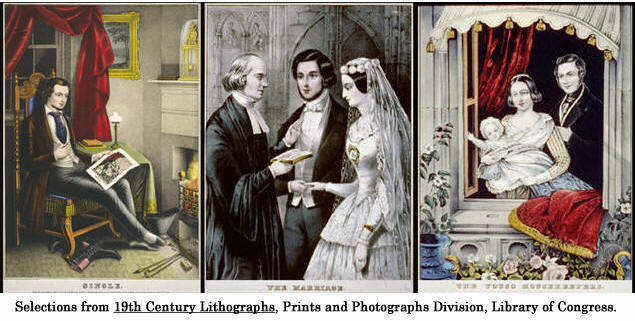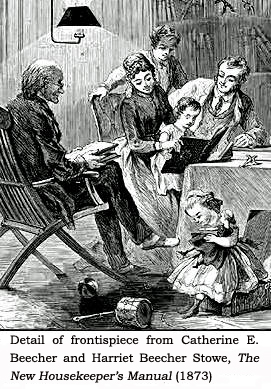
The nineteenth-century preoccupation with
shielding the 'nursery and the bedchamber' from the glare of
publicity reflected the popular idealization of the family as a
shelter from the competitive pressures and corrupting influences of
modern industrial life. Caught up in a decades-long obsession
with domesticity, books, pamphlets,
periodicals, drawings, lithographs, and public lectures celebrated
parenthood, marriage, childhood innocence, and filial duty.
Although these familial obligations were always presented as
expressions of the natural order, they apparently did not come to
people naturally. Consequently, scores of manuals dispensed
advice on how to be a good mother, father, husband, wife, sister, or
brother, and, so as not to neglect those unfortunates who had been
inexplicably excluded from the marriage bond, writers such as
William Aikman, author of Life at Home (1870), also provided moral instruction to bachelor
uncles and maiden aunts.

According to Aikman, "mere earthly friendships"
could not
compare with the spiritual fulfillment one could find within the
family, the flower of human history, the means for the development of
character and the multiplication of happiness, the gift from God
that made "bearable the loss of Eden." It was useless, in
Aikmans' view, to talk of the "brotherhood of man" since "sin" or
"selfishness, rather, and consequent distance and coldness have
become the type of human intercourse." Happily, however, the
man who had been beaten down by the cruelties and disappointments of
the world had a refuge,
a place where he comes, sick it, may be, and sad of heart, and
where he knows that he shall not be disappointed. Careworn
and weary, he enters his home after a day of bitterness...Here is one
who will sympathize; here are more than one who will think well of
him and nothing but well; here are eyes which will look lovingly,
and voices which will speak tenderly; here are hands that will
sooth his aching head, a bosom on which he may lean; here are
little ones that will clamber on his knee and tell him that of all
in this world he is the dearest and wisest and best.
16s
For Aikman, as for Warren, Brandeis, and
Reade, reticence was essential to the cohesion of
family life. He therefore advised both husbands and wives
to remain silent about family matters because the mortification
attached to revelation would and should eclipse nearly every other
concern. On one hand, Aikman argued, "For a wife to
permit to escape her lips, so that it reaches a third person, a
complaint against her husband, to expose his faults or give
utterance of her grievances, is to do a foolish and usually a wicked
thing." On the other, "for a husband openly t o censure his
wife, to speak of her habits or her acts so that others shall think
less respectfully of her, is to proclaim his own shame." Aikman did
not feel obliged to explain exactly why the disclosure of family
problems was so patently misguided. He simply asserted, "It is
fortunate that the common sense of men holds this in scorn" because
"no third person can or ought to come in; to even ask the advice
of a third person is to give evidence
that the identity of the married life is gone." 17s
o censure his
wife, to speak of her habits or her acts so that others shall think
less respectfully of her, is to proclaim his own shame." Aikman did
not feel obliged to explain exactly why the disclosure of family
problems was so patently misguided. He simply asserted, "It is
fortunate that the common sense of men holds this in scorn" because
"no third person can or ought to come in; to even ask the advice
of a third person is to give evidence
that the identity of the married life is gone." 17s
The irony—a quality that seems to be
omnipresent in every discussion of privacy—of Aikman's admonition is
that it was given in an advice book. However, from Aikman's
perspective, advising people not to ask for advice was perfectly
logical because the calamity to be avoided was public admission.
What seemed most terrible to Aikman and his contemporaries was not
family troubles in themselves, but the act of confession or, as
Aikman put it, providing 'evidence' of family disunity. Thus
Aikman gave his readers a way to solve their problems discreetly.
By perusing his book for general edification rather than any
particular personal reason, they could work out their family issues
without ever having to 'proclaim their own shame.'
Works such as Life at Home not only
threw up a fence between public and private activity, they
also specified private life as the locus of individual fulfillment.
In placing the domestic circle at the pinnacle of civilization,
writers like Aikman reversed the priority of public over private
that was basic to the Western political tradition from Plato to
Marx.18s Without setting Aikman on the
level of classical political philosophy or pretending to summarize
that tradition, it matters that the cult of domesticity embodied in
Aikman's writings turned Marx's formulation of the relationship
between freedom and necessity on its head. Marx, who completed
the first volume of
Capital two years before Life at Home was published, followed mainstream political
thought in locating the family within the realm of necessity, the
sphere in which human beings act according to instinct, and which
stands in opposition to politics, the sphere in which human beings
realize their capacity to reason and, thereby, distinguish
themselves from lower forms of life. 19s
Marx broke with this tradition, not by supposing that humanity would
escape from biological requirements, but by describing the family as
an impermanent result of the historical collision between instinct
and scarcity. Once workers succeeded in bringing the abundance
created by capitalism under their conscious control, the family,
which was merely a vestige from an earlier stage of society, would
vanish, and human beings would be free to develop emotional
relationships untouched by bourgeois possessiveness. Marx did
not say that that the realm of necessity would ever become a thing
of the past, but he did predict that collective control of the means
of production would enable both men and women to transcend the
seemingly stultifying relationships that were glorified in books
like as Life at Home.